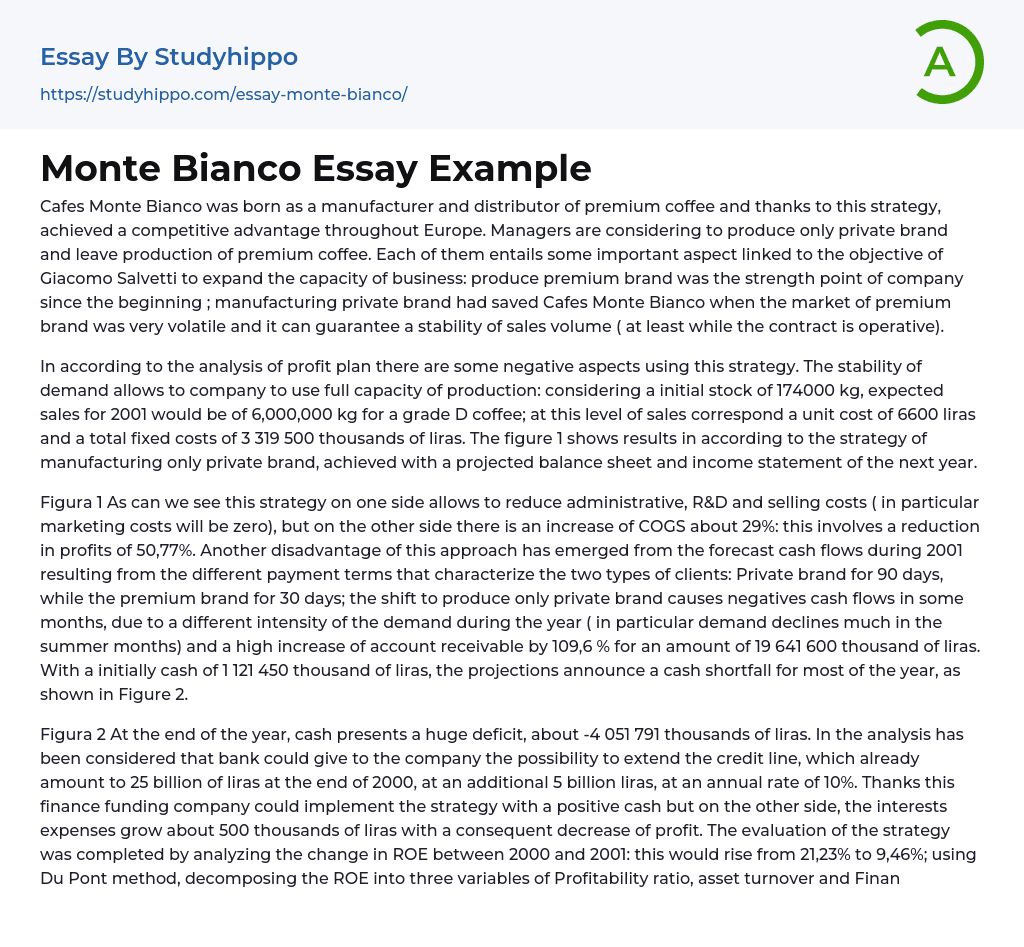
Initially, Cafes Monte Bianco differentiated itself in Europe by being both a manufacturer and distributor of excellent coffee. Currently, the managers are considering the option to solely concentrate on producing their own brand and stop making high-quality coffee. These choices are crucial for Giacomo Salvetti's goal of expanding the business. Manufacturing the premium brand has always been the company's strength since its beginning, while producing the private brand has ensured stability in sales volume during uncertain market periods as long as the contract is active.
The profit plan analysis reveals some disadvantages of this strategy. The company can fully utilize its production capacity due to the stability of demand. Assuming an initial stock of 174,000 kg, the expected sales for grade D coffee in 2001 would be 6,000,000 kg. At th
...is sales level, the unit cost would be 6,600 liras and the total fixed costs would amount to 3,319,500 thousand liras. Figure 1 displays the results obtained from manufacturing only private brand products as shown in the projected balance sheet and income statement for the upcoming year.
Figure 1 demonstrates the pros and cons of this strategy. On the positive side, it helps cut down on administrative, R&D, and selling costs, particularly marketing costs. However, there are drawbacks to this approach such as a 29% increase in COGS and a significant 50.77% decline in profits. Another disadvantage is the payment terms for different customer types in 2001. Private brand clients have a 90-day payment term while premium brand clients have a shorter 30-day payment term. This decision leads to negative cash flows during certain months due to fluctuating demand throughout th
year, especially lower demand during summer months. Additionally, there is a substantial surge of 109.6% in account receivable totaling an impressive sum of 19,641,600 thousand liras. Despite having an initial cash amount of 1,121,450 thousand liras available, projections indicate that there will be a cash shortfall for most of the year as depicted in Figure2.
Figure 2 shows that there is a significant cash deficit of approximately -4 051 791 thousands of liras at the end of the year. The analysis considers the possibility of the bank increasing the company's credit line. Currently, this credit line is 25 billion liras by the end of 2000 and could be expanded by an additional 5 billion liras with an annual interest rate of 10%. While this financing would allow for positive cash flow and implementation of the company's strategy, it would also result in an increase in interest expenses of around 500 thousand liras, leading to a decrease in profit.
To evaluate this strategy, changes in Return on Equity (ROE) between 2000 and 2001 are examined. It is projected that ROE would decrease from 21.23% to 9.46%. By using the Du Pont method and analyzing components like profitability ratio, asset turnover, and financial leverage ratio separately, we can gain a better understanding of how this change will impact the company.
The company primarily relies on debt as its main financing method, which exceeds the use of venture capital. However, using ROE as a measure of efficiency is not sufficient as it fluctuates based on tax debt. Therefore, additional financial data is necessary to gain a comprehensive understanding of the company's real estate. Overall, these details
present a negative evaluation of the strategy to exclusively produce private labels, as the drawbacks outweigh the benefits for the company.
- Wal-Mart essays
- Discover essays
- Accounting essays
- Marketing essays
- Automation essays
- Business Cycle essays
- Business Model essays
- Business Operations essays
- Business Software essays
- Corporate Social Responsibility essays
- Infrastructure essays
- Logistics essays
- Manufacturing essays
- Multinational Corporation essays
- Richard Branson essays
- Small Business essays
- Cooperative essays
- Family Business essays
- Human Resource Management essays
- Sales essays
- Market essays
- Online Shopping essays
- Selling essays
- Strategy essays
- Management essays
- Franchising essays
- Quality Assurance essays
- Business Intelligence essays
- Corporation essays
- Stock essays
- Shopping Mall essays
- Harvard Business School essays
- Harvard university essays
- Trade Union essays
- Cooperation essays
- News Media essays
- Waste essays
- Andrew Carnegie essays
- Inventory essays
- Customer Relationship Management essays
- Structure essays
- Starting a Business essays
- Accounts Receivable essays
- Auditor's Report essays
- Balance Sheet essays
- Costs essays
- Financial Audit essays
- International Financial Reporting Standards essays
- Tax essays
- Accountability essays



